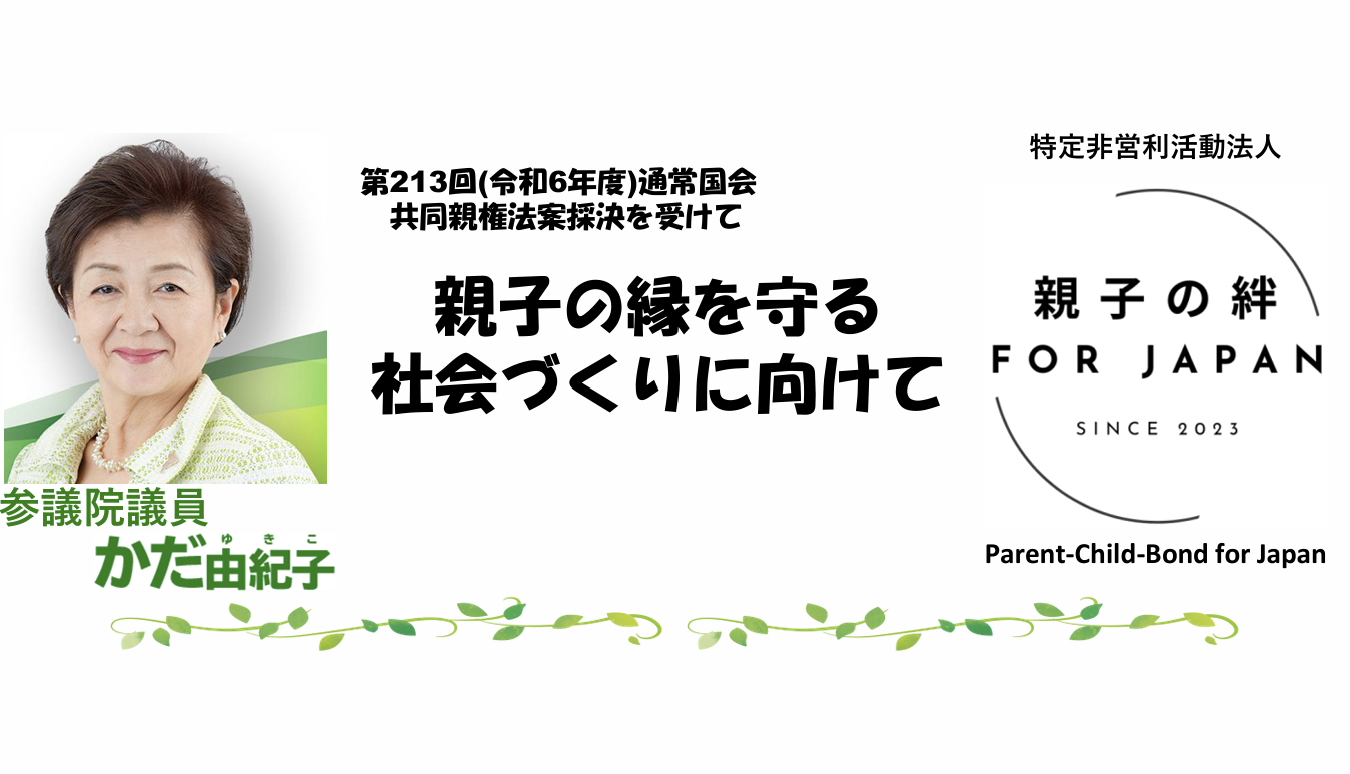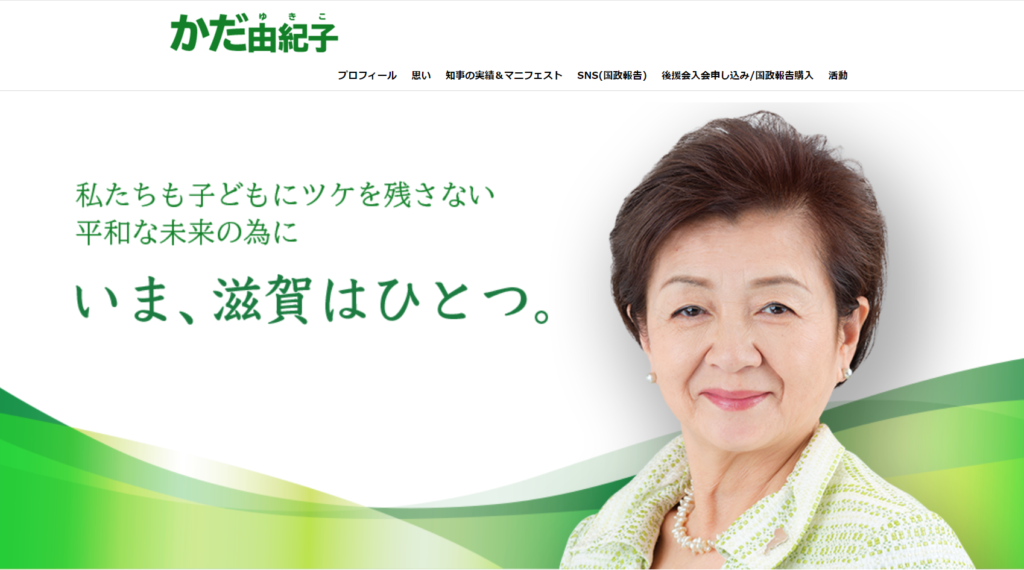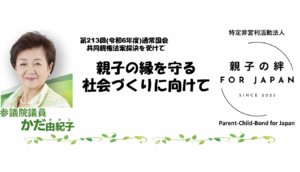参議院議員 嘉田由紀子議員と共同親権に関しての意見交換会をしてきました。

NPO法人親子の絆forJAPANの役員等4名で嘉田由紀子先生国会事務所を訪問し、共同親権法案採決を踏まえて「今」私達、大人が取り組むべき課題について意見交換をしました。
嘉田由紀子先生に承諾を得た上で、下記に当日の議事録の一部を掲載いたします。ご参考いただけますと幸いです。
意見交換|共同親権法案の行方を見据えて
はじめに: 嘉田先生の生い立ちと「親子の絆」についてのエピソードをお聞かせください。
私は戦後の昭和20年代に埼玉県の養蚕農家に生まれました。戦前地主であった生家は戦後の農地解放政策の影響を受けて急速に困窮へと陥り、皆が明日を生き抜くための過酷な農業労働に従事し、中でも私の母は過労により結核まで患ってしまいました。
ただ当時は家制度による男尊女卑の社会です。祖父は病気で寝込む母に対し、包丁をつきつけながら「畑に出ろ!」と大声で叫び、その光景は未だに私の脳裏にのこり、私はそうした家制度の下で過酷な人生を強いられる女性の姿を、幼い頃から目の当たりにしてきました。
ですがそんな過酷な環境の中でも、母は私に精一杯の愛情を注いでくれました。当時は卵や白いご飯が大変に貴重なものでしたが、母は早朝こっそり卵を焼き、白いご飯を炊き、幼かった私たち子どもに食べさせてくれました。私は母と畑仕事をしながら育ち、幼稚園も保育園も行っていません。
その後も数多くの苦難・苦痛に面してきましたが、どの場面においても「母が自分を愛してくれている」、それが常に私の心の奥底に存在し、おかげで、今日までの様々な困難を乗り越えてくることができました。
「母は私の傍にいる」、1996年に亡くなった母ですが今この瞬間でも本気でそう思っています。そしてそれが、私の「親子の絆」です。
先生が家族社会学・農学の道に進まれたのも、そういった背景があったからでしょうか。
そうです。
「女に教育はいらない」という祖父の言い分の下、私は隠れて勉強を重ね、女性である自分の人生を自分自身で切り開こうと思い、家族社会学や文化人類学を学び、そこでアフリカやアメリカなど、世界の女性の暮らしや家族の仕組みを知り、社会全体をも良くしていきたいという気持ちに繋がりました。それが2006年に滋賀県知事に挑戦し、学者ではできない社会変革をめざした根本です。
また畑仕事をしながら母は「名前のない草はない」と言い、周囲の自然界に興味を抱いたことなどから農学や環境学の勉強にも取り組んできました。
先生は勉強に励んでおられる時期にお子様を授かられたと伺っておりますが、当時は大変だったのではないですか。
夫と共にアメリカで勉強している最中のことでした。まだ1970年代です。
当時はアメリカでも女性の社会進出が十分には進んでおらず、私は研究と子育てのどちらを選ぶべきか、深く思い悩んでおりました。ですが、私が深刻な顔でそれをアメリカでの社会心理学の教授に相談したところ、彼女はこう言ったのです。「あなたは仕事と研究で主体的な納税者となり、そのお金で、社会で子供を育ててもらえばよい」と。
つまり、「仕事と子育て」は「どちらか一つ」の関係ではなく、「両立させうる関係」であって、その為の「社会的基盤」を作るのが私達の役割であると教えてくださいました。そして、それはその後の私の研究者・政治家としての基盤を形作るものとなりました。
「女性の社会進出が進んでいる国ほど出生率が高い」というレポートを拝見したことがありますが、指導教授の教えが正にそれだったのかもしれませんね。

その通りだと思います。しかし、当時の現場で実際にそれをやるのは苦難の連続でした。
当時は多くの幼稚園や保育園が、「大学院生の子供は預かれない」といって保育を拒否し、心身共に挫けそうになっていたところ、当時の大津市が、「大津市の保育園で子供を預かる」と判断して下さり、そのお陰で、私は大学で博士課程まで終えることができました。当時の大津市の政治と社会状況が育ててくれたのが今の私と私の子供たち、そして今孫6人も大津と滋賀県で育ててもらいました。
だからこそ私も社会をより良くしていきたいと考えています。

なるほど。今回のテーマである共同親権は子育てを共同するという観点から、女性の社会進出に大きく貢献する効果も期待できそうですね。
その共同親権を軸とする今回の民法改正についてですが、国会での議論をどのように振り返っておられますか?
今回の民法改正は「絶対的単独親権」から「選択的共同親権」に移行させるものですが、私はそれを超えた「原則的共同親権」が必要不可欠だと考えていましたので、課題が強く残る形のものになったと振り返っています。
色々な考え方はありますが、「選択的共同親権」は父母の一方が子を捨てるという選択を可能にさせてしまう側面が含まれており、私自身が子どもの立場だったら、「お父さんお母さん、どうするんだろう」と悩んでしまいます。
社会として、親として、子供達に「自分は捨てられた」と感じさせてしまうような場面を作り出してしまうのは、避けるべきではないでしょうか。私は国会の場でもこの点を繰り返し質疑してまいりましたが、残念ながら十分な議論が尽くされたようには見えませんでした。また、海外には共同親権に関する事例、更に言うと、単独親権から共同親権に移行し、「単独親権に戻そうという国がある」という日本の研究者がおりますが、その国の大使館などに問い合わせると、その情報は事実ではない、と回答されます。日本国内にも、海外からのかなり誤った情報もはいっています。そんな中、日本は「選択的共同親権」という新たなものを導入し、今後、その中身が一体どのようなものになるのか、今回だされた法案が抜け穴だらけなので、ここまで賛否両論が渦巻く結果となってしまっています。
法案作成者の責任は大きいです。だからできるだけ早い段階で見直しが必要という、見直し条項を最後にいれました。
報道では様々な見解から物事が報じられ、一部では「親権」と「DV・虐待」をセットで語る傾向が見られますが、これについてどのようにお考えでしょうか。
親の本質がDVや虐待であるはずがないのですから、私は別問題として捉えています。
いくつかの国では、DVに対して毅然と刑罰を適用する一方で、それを「親の心のケアに関する医療の問題」として捉え、その親が立ち直って子供に再会するまでのプログラムが組まれています。
つまり、親と子の「縁切り」は「最後の最後の手段」であって、決して「最適な手段」ではありません。
また、報道では「男性が加害者、女性が被害者」といったバイアスが見受けられますが、過去に滋賀県で行われた調査では、虐待の7割は実母によるもので、その半分は離婚後の片親家庭でした。
つまり、DVや虐待に男性/女性の偏りはなく、単独親権制度による「縁切り文化」こそが、子供達を虐待の被害に追いやっているという真実がそこに現れていたのです。


「脱・縁切り文化」、先生は国会でもこれを繰り返し述べておられましたね。
そうです。
私が幼い頃、家制度の下で家を追い出された母親達は自分の子供達に会いに行くことができず、多くの親子が涙を流しておりました。大正時代ですが詩人の金子みすずは、子どもをうばわれ自殺をしてしまいました。時代が変わり、今では多くの離婚事例において女性が親権を持ち、男性親が子供に会えなくなってしまうケースが見受けられますが、それだと単に男女が入れ替わっただけですので、根本部分の問題である「親子の縁切り文化」が残り続けてしまいます。
私達は子供達の為に、夫婦の縁が切れたとしても「親子の縁」を切らせない為の社会を作り上げる必要があります。その為には、今、一つひとつの家庭と直接接している全国1741の市区町村の基礎自治体や皆さんのような民間団体の活動が非常に重要になってきます。片親家庭の貧困、メンタル面の苦しみを抱えてしまった子供達のケアなど、今日まで自治体の現場で活動してこられた方々が、実は、単独親権の問題の深刻さを肌で分かっています。
離婚時の共同養育計画書、離婚の際の「親への講座」「子への講座」、ADR(裁判外紛争手続き)の活用など、これからは自治体や皆さんのような団体が主体となって「法律の実効性ある中身」を作り上げていくことが非常に重要なフェーズとなっていきます。
私も日本中の「親子の絆」を守るため、国内各地での講演や勉強会などを積極的に開催し、参加し、「脱・縁切り文化」「縁結び文化」に向けた活動に取り組み続けていきたいと思っています。


示唆に富む、有意義な意見交換会となりました。
NPO法人 親子の絆 for JAPAN 一同より
改めて厚く御礼申し上げます。


